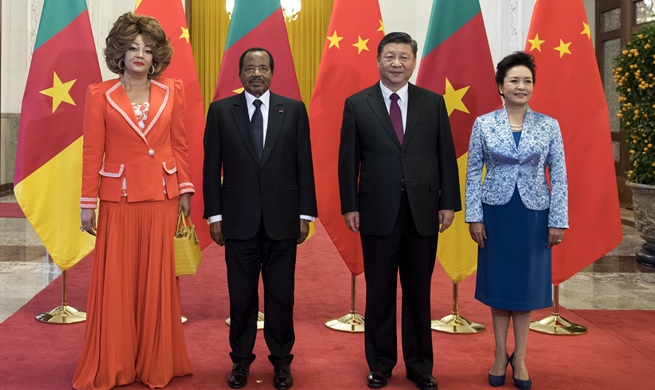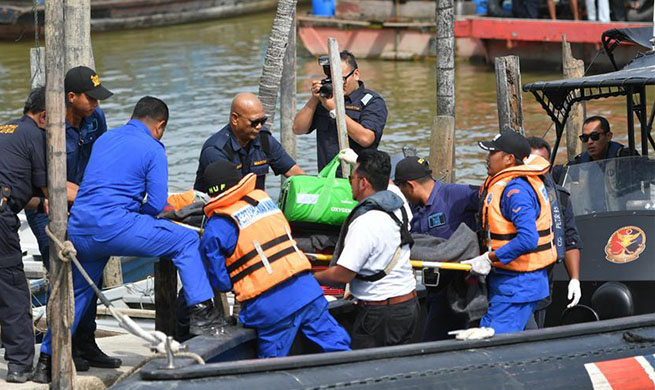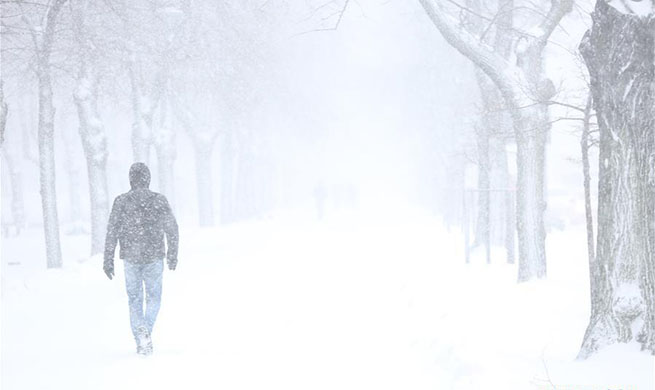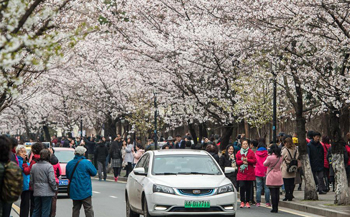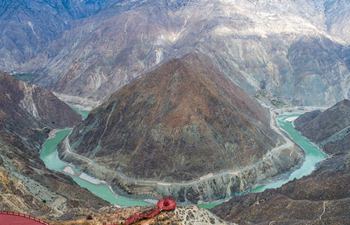DAMASCUS, March 23 (Xinhua) -- A total of 3,500 kidnapped people are expected to be released from the rebel-held Douma district in the Syrian capital Damascus' Eastern Ghouta area on Friday evening.
This was part of a deal reached between the rebels and the Syrian army which also includes the evacuation of 3,000 people with medical conditions from Douma, according to the War Media, the media wing of the Syrian army and its allies.
The army is making rapid progress coupled with evacuation of rebels and civilians alike from that area that has been the major threat to the capital throughout the past seven years of the Syrian war.
Douma is controlled by the rebel group known as Jaish al-Islam, or the Islam Army, which has so far been out of other agreements recently reached with other rebel groups in Eastern Ghouta.
Earlier in the day, an agreement was reached for the evacuation of rebels and their families from new areas in Eastern Ghouta, according to the state TV.
As many as 7,000 rebels and their family members are to leave areas of Jobar, Zamalka, Arbeen, and Ayn Tarma in Eastern Ghouta, and the deal covers the main rebel groups in control of those areas, namely the Failaq al-Rahman, and the al-Qaida-linked Nusra Front, according to the report.
The agreement, which was mediated by the Russians, will also see the release of kidnapped people by the rebels ahead of their evacuation and lists of names will be handed over to the Russian side, the report said.
The evacuation will take place on Saturday at 9:30 a.m. (0730 GMT) after the rebels hand over maps of the tunnels they dug and mines they planted in the aforementioned areas.
The fresh deal comes a day after the Failaq al-Rahman group declared a unilateral ceasefire to negotiate its withdrawal from the region.
The War Media reported that the Failaq al-Rahman rebels, or the Rahman Legion, declared a cease-fire in the central part of Eastern Ghouta, namely in the areas of Jobar, Zamalka, Ayn Tarma, Hazzeh, and Arbeen, as of midnight Friday.
These areas have been the launching pad for the Failaq al-Rahman rebels for firing mortar and rocket shells on the Syria capital of Damascus throughout the last seven years of crisis.
This development came as the Syrian army captured the farms of Ayn Tarma on Thursday and advanced towards that area, which is a key stronghold of the Failaq al-Rahman rebels.
The Syrian Observatory for Human Rights said calm prevailed areas under Failaq al-Rahman's control in Eastern Ghouta Friday as a delegation of this group held talks with Russians.
The negotiation for withdrawal coincided with the evacuation of the Ahrar al-Sham rebels from Harasta city, also a key rebel stronghold in Eastern Ghouta.
As many as 1,580 rebels and their families evacuated Harasta on Thursday evening as hundreds more assembled on Friday to follow lead and evacuate towards rebel-held areas in the northwestern province of Idlib.
The Syrian army has already captured over 80 percent of Eastern Ghouta and is closing in on the remaining rebel-held areas amid ongoing military offensive as tens of thousands of civilians have been fleeing Eastern Ghouta toward government-run shelters after the Syrian troops opened several humanitarian corridors upon advancing in Eastern Ghouta.
If the evacuation took place as planned, it would be a major victory for the Syrian army and a massive setback for the rebels' presence in Eastern Ghouta, the last remaining threat to the capital.
Eastern Ghouta, a 105-square-km agricultural region consisting of several towns and farmlands, poses the last threat to the capital due to its proximity to government-controlled neighborhoods east of Damascus and ongoing mortar attacks that target residential areas in the capital, pushing people over the edge.
Four major rebel groups are currently positioned inside Eastern Ghouta, namely the Islam Army, Failaq al-Rahman, Ahrar al-Sham, and the Levant Liberation Committee, known as the al-Qaida-linked Nusra Front.
The UN humanitarian agencies have sounded the alarm about the worsening humanitarian situation for 400,000 people in that region, where activists said over 1,000 people have been killed since late last month by the heavy bombardment and military showdown.










